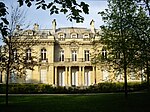The Archdiocese of Russian Orthodox churches in Western Europe (abbreviation: AROCWE, Russian: Архиепископия православных русских церквей в Западной Европе), also called Archdiocese of Parishes of the Russian Tradition in Western Europe (Russian: Архиепископия приходов русской традиции в Западной Европе), is a Paris-headquartered diocese consisting of parishes in Russian orthodox tradition, located in Western Europe. The diocese hails from the Provisional Administration of Russian Parishes in Western Europe, created in 1921.
At the time of the creation of the exarchate, the diocese comprised Russian Orthodox parishes that were under administration of the Russian émigré bishop Eulogius Georgiyevsky. The latter decided to switch under the jurisdiction of the Ecumenical Patriarchate as he was unwilling to continue his administrative subordination to the Moscow Patriarchate, then under full control of the Soviet State, nor was he willing to recognize the authority of the Yugoslavia-based Russian Orthodox Church Outside Russia, then headed by Anthony (Khrapovitsky).
In 1931, Metropolitan Eulogius, along with the clergy and laity who supported him, was admitted to the Ecumenical Patriarchate of Constantinople; these parishes received the status of a temporary Exarchate in Western Europe, which was abolished in 1965. After that, until 1971, this Association existed as the "Orthodox Archdiocese of France and Western Europe and Russian Western European churches of diaspora". In 1971, the archdiocese was again accepted into the Ecumenical Patriarchate of Constantinople. New reorganization was implemented on 19 June 1999, when Patriarch Bartholomew of Constantinople created the exarchate by granting it a tomos. 27 November 2018 Holy Synod of the Patriarchate of Constantinople abolish tomos of 1999; the former exarchate's parishes were instructed to join the relevant dioceses of the Patriarchate of Constantinople. The archdiocese, whose legally binding Statute (Article 11) expressly says that its primate must be a bishop of the Ecumenical Patriarchate, continues to exist as a legal entity, nevertheless.Having voted to continue as a legal entity in February 2019, the Archdiocese as an entity failed to pass a resolution to switch to the jurisdiction of the Patriarchate of Moscow on 28 September 2019 as was proposed by its primate Archbishop John (Renneteau), who had personally joined the Moscow Patriarchate. 7 October 2019 Holy Synod of the Patriarchate of Moscow confirmed the acceptance of clerics and parishes "who expressed such a desire". Not all parishes and clerics of the former Exarchate followed Archbishop John, joining various jurisdictions such as the Greek Orthodox Metropolis of France (under the Ecumenical Patriarchate), the Romanian Orthodox Church, the Bulgarian Orthodox Church and the Serbian Orthodox Church.










